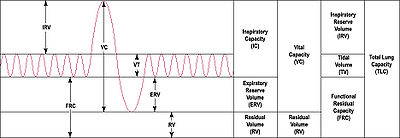
Vital capacity
Encyclopedia

A person's vital capacity can be measured by a spirometer which can be a wet or regular spirometer
Spirometry
Spirometry is the most common of the pulmonary function tests , measuring lung function, specifically the measurement of the amount and/or speed of air that can be inhaled and exhaled...
. In combination with other physiological measurements, the vital capacity can help make a diagnosis of underlying lung disease. The unit that is used to determine this vital capacity is the millilitre (ml).
A normal adult has a vital capacity between 3 and 5 litres. Predicted normal values for VC can be calculated online and depend on age, sex, height, weight and ethnicity as well as the research study that they are based upon.

